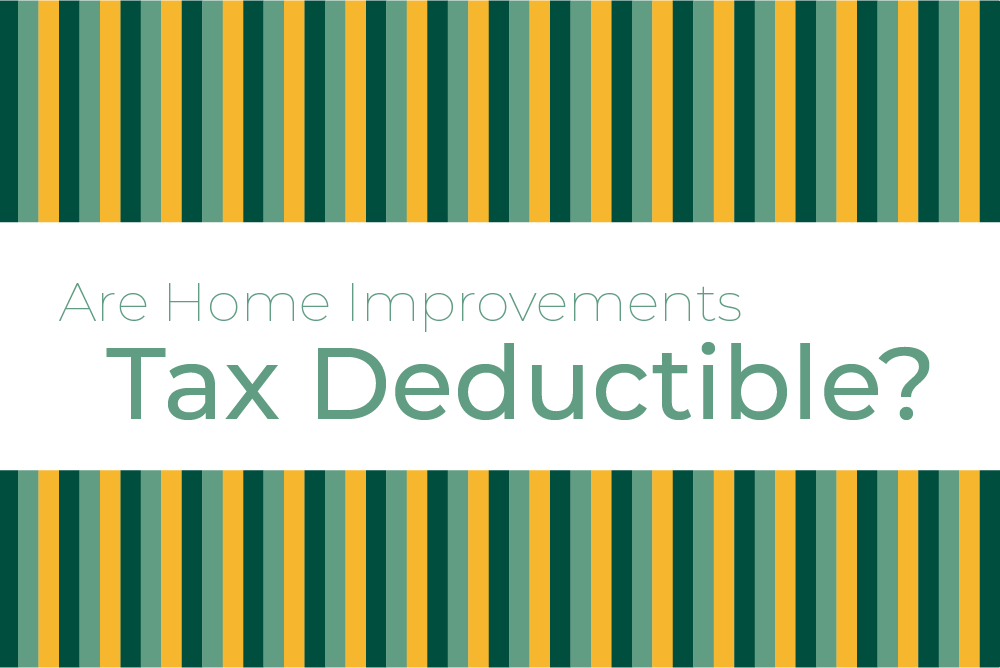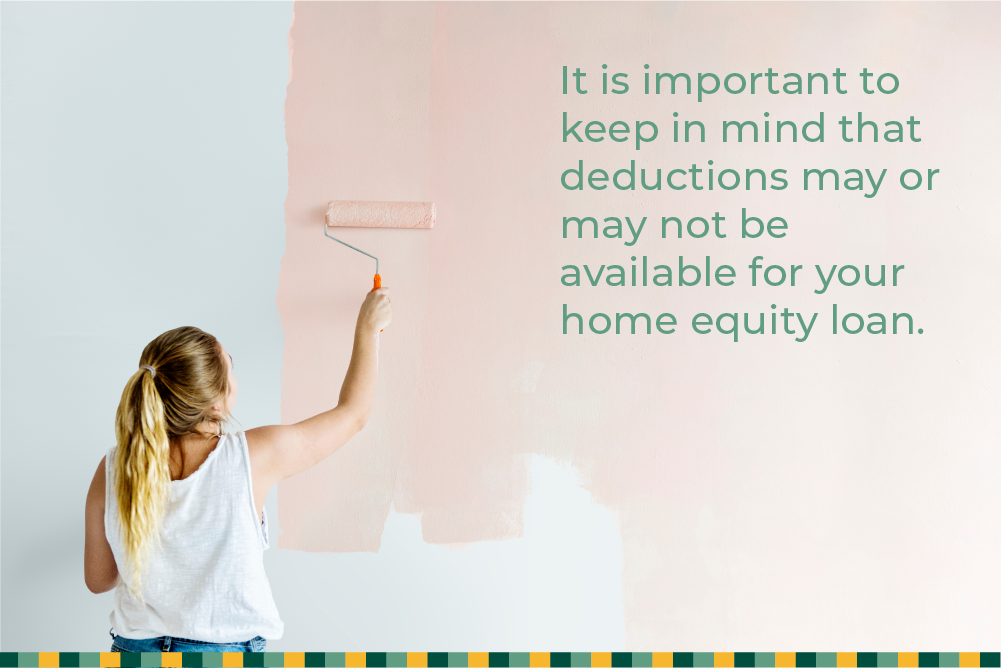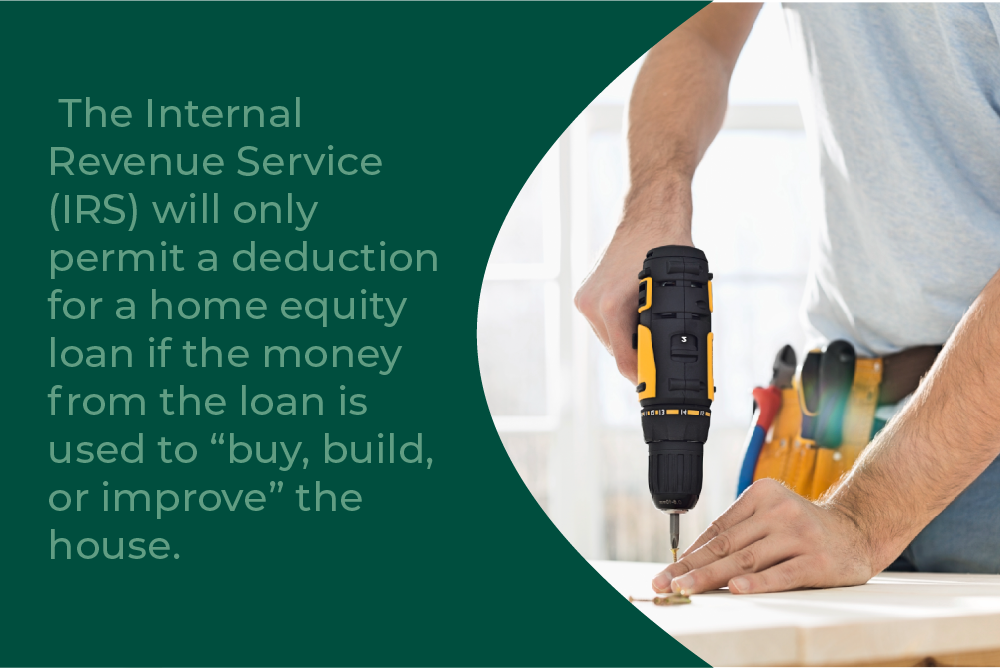Are Home Improvements Tax Deductible?

Everyone likes the thought of fixing up their home, but that enthusiasm starts to wane as the associated price tag goes up. Luckily, there are loans available to make sprucing up your home more affordable. Better still, you may be able to get a tax break on the loan based on certain conditions. Homeowners who take out home equity mortgages in Las Vegas may be able to deduct the interest associated with renovations from their taxes.
Who can Deduct Interest on a Home Equity Loan?
It is important to keep in mind that deductions may or may not be available for your home equity loan. Factors that influence your ability to deduct interest on a loan include:
- When you got the loan
- How much money was borrowed
- What the funds were used for

Tax Cuts and Jobs Act of 2017
The Tax Cuts and Jobs Act of 2017 was instrumental in providing interest deductions. The Act permits a total deduction up to $750,000 for joint filers who took out a loan after December 15, 2017. Those who choose to file separately can deduct interest in taxes up to $375,000. In order to qualify for these deductions, funds must be used for home improvements in specific ways. The funds must be used for buying, building, or substantially improving your home.
Limitations on Tax Deductions
In order to qualify for tax deductions on the interest payments for your mortgages or reverse mortgages in Las Vegas, certain conditions must be met. For starters, the improvements must also be made only to the home that was used for securing the loan in the first place. For instance, you cannot take out a loan and use some of the funds for the original home while fixing up a second home or a vacation house at the same time. Additionally, there are limitations on mortgage loans that are still outstanding. For instance, if you have an existing mortgage balance of $500,000, you will only be able to deduct taxes for interest paid on up to $250,000 of the mortgages in Las Vegas.
Time is another consideration when determining tax breaks for interest paid on home improvements. If your home equity loan started before December 15, 2017, the limits are higher for joint and separate filers, providing that the money was used to build, buy, or improve the house.

What Exactly Does “Buy, Build, or Improve a Home” Mean?
The Internal Revenue Service (IRS) will only permit a deduction for a home equity loan if the money from the loan is used to “buy, build, or improve” the house. Generally, you need to make a “substantial” improvement to the home, which is one that either adds value to the house, extends its longevity and improves its habitability, or makes the home suitable for a new use.

Home Improvements
To make things more clear, the IRS provides some examples of acceptable improvements to the home. These include:
- Adding on to the house
- Putting on a new roof
- Renovating the kitchen
- Getting a new HVAC system
- Redoing the driveway
The IRS has a complete list of items that qualify for a deduction.
Are Home Improvements Tax Deductible
If you want to reap the benefits of a tax deduction, all items will need to be deducted when it is time to pay taxes. Along with all the IRS-approved expenses, your deduction list should also include interest from a home equity loan. Once you’ve added all your deductions together, compare them with a standard deduction to determine if you are better off itemizing or going with a standard deduction. However, the tax deduction is only possible if your total deductions amount to more than the standard deduction amount for the tax year. For married couples who are filing jointly, the standard deduction is $25,100. The deduction comes to $12,550 for single filers or for a married couple filing separately. For the head of a household, the standard tax deduction in 2021 is $18,800.

It is important to note when you are preparing taxes that you can either go with the standard deduction or itemize deductions, but you won’t be able to do both. If you have trouble deciding which option to go with, a loan officer in Las Vegas can help you decide which deduction to go with and make sure you understand all your options before you choose to go with one kind of deduction or the other.
What Documents Need to be Included?
If you want to deduct a home equity loan interest when you pay taxes, the IRS requires certain information. You will need to provide the following documentation:
- Mortgage Interest Statement (Form 1098)
- Documentation of any additional interest payments
- Proof of how you used home equity funds
The Mortgage Interest Statement (Form 1098) is a document provided by the lender for your home equity loan. Form 1098 is a statement documenting all your interest payments in the past year.
Along with this form, you’ll need to provide a statement showing any additional interest you may have paid. If you paid more interest than what Form 1098 indicates, you’ll need to provide a statement along with your tax return that shows the total amount of all interest paid, along with an explanation for the differences between the interest payments indicated on Form 1098 and any other interest payments.
Lastly, the government will want to see how the home equity funds were spent. You should hold onto all invoices and receipts showing how the improvements have benefited your home, which includes adding to its value, longevity, and making it more habitable through reverse mortgages in Las Vegas. When you make a list of how you used the funds, don’t forget to add in the costs for labor, permits, and materials needed to improve the home.
Other Advantages of Home Equity Loans
Along with allowing you to deduct interest payments, mortgages in Las Vegas have other advantages, too. They generally have favorable interest rates, especially in comparison with personal loans, credit cards, and other types of unsecured debt. Additionally, they have longer repayment terms, which can range from 10-30 years. With a home equity loan you also have faster access to larger volumes of money, which can make it easier to pay for larger expenses.

Deducting Interest on a Second Home
When you are deducting interest payments, keep in mind that you can deduct interest for a maximum of two properties. You will be subject to the same limits overall, but you can divide the loan funding between two homes instead of just reserving a loan for one. As with a primary home, there are some conditions that the second home must meet to qualify. The second home must also be used for personal use. It can’t be rented out or used for non-residential purposes. Additionally, you must use the home for at least two weeks per year or 10% of the time that the home is rented out in order to avoid having it be classified as a rental property and therefore ineligible for a mortgage interest deduction.
If you are looking to deduct interest payments for a home equity loan, it is always a good idea to consult with professionals to learn more about your options and how to qualify. A skilled loan officer in Las Vegas can help you navigate the process with greater ease and confidence. (Things you should know before moving to Las Vegas.)








